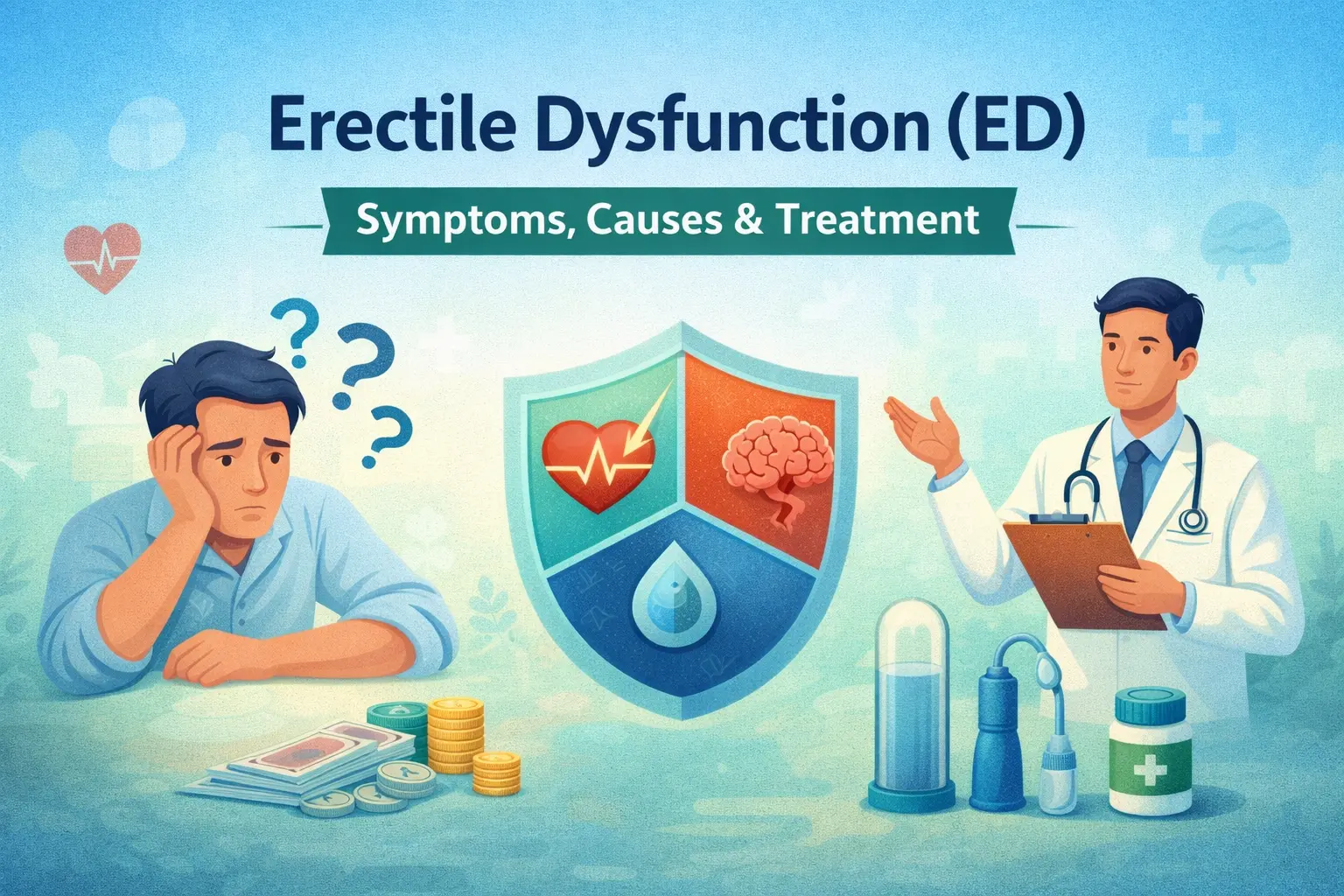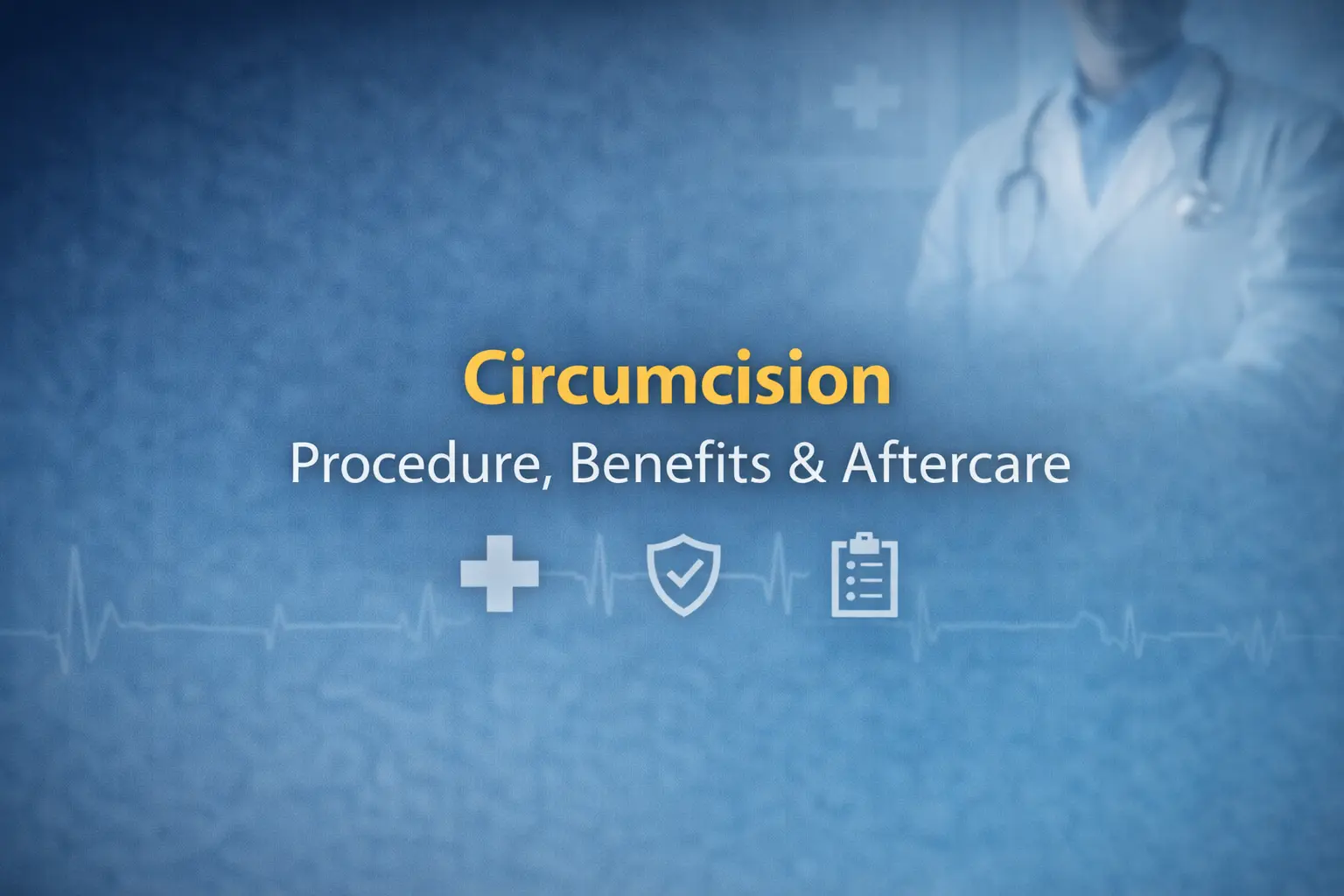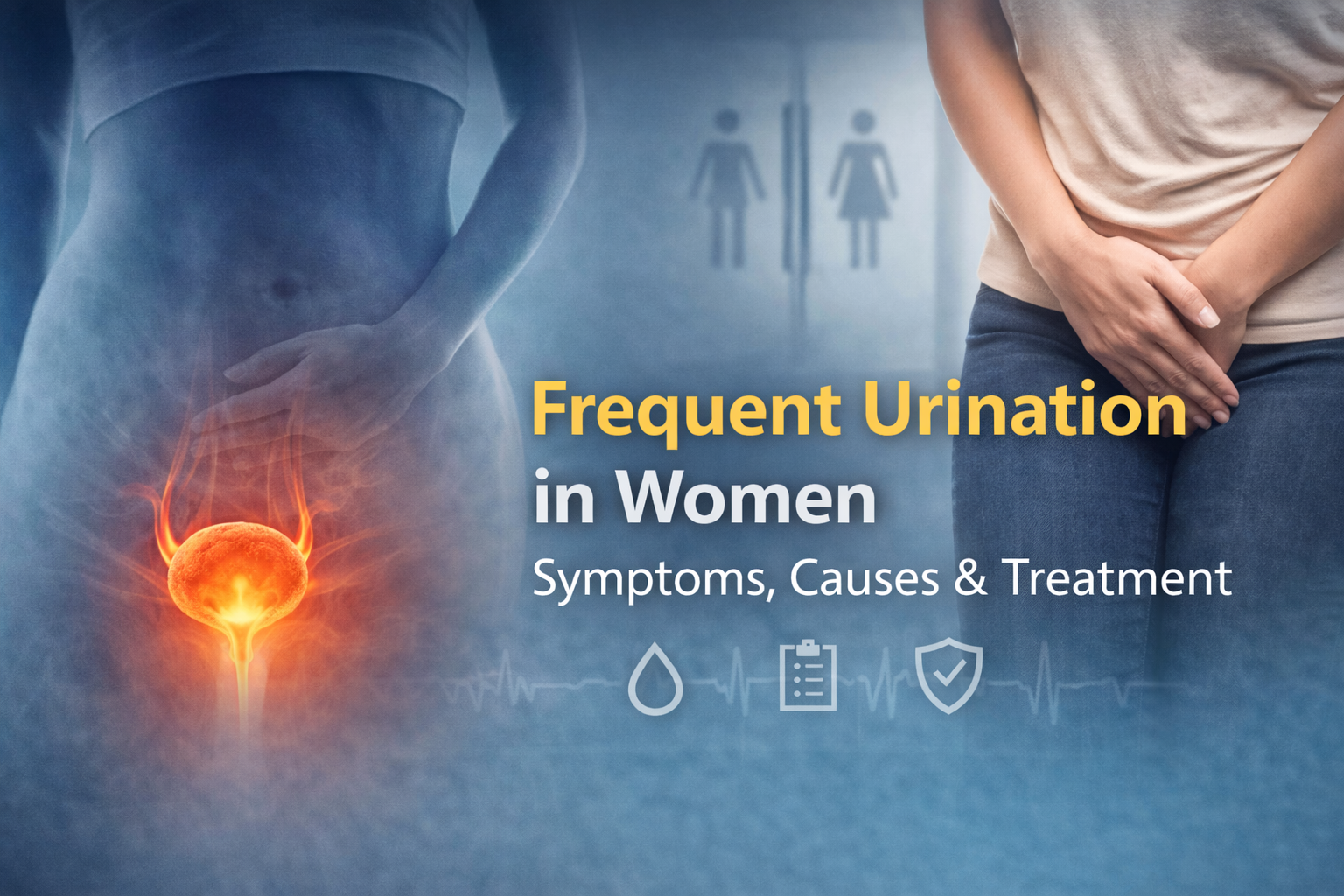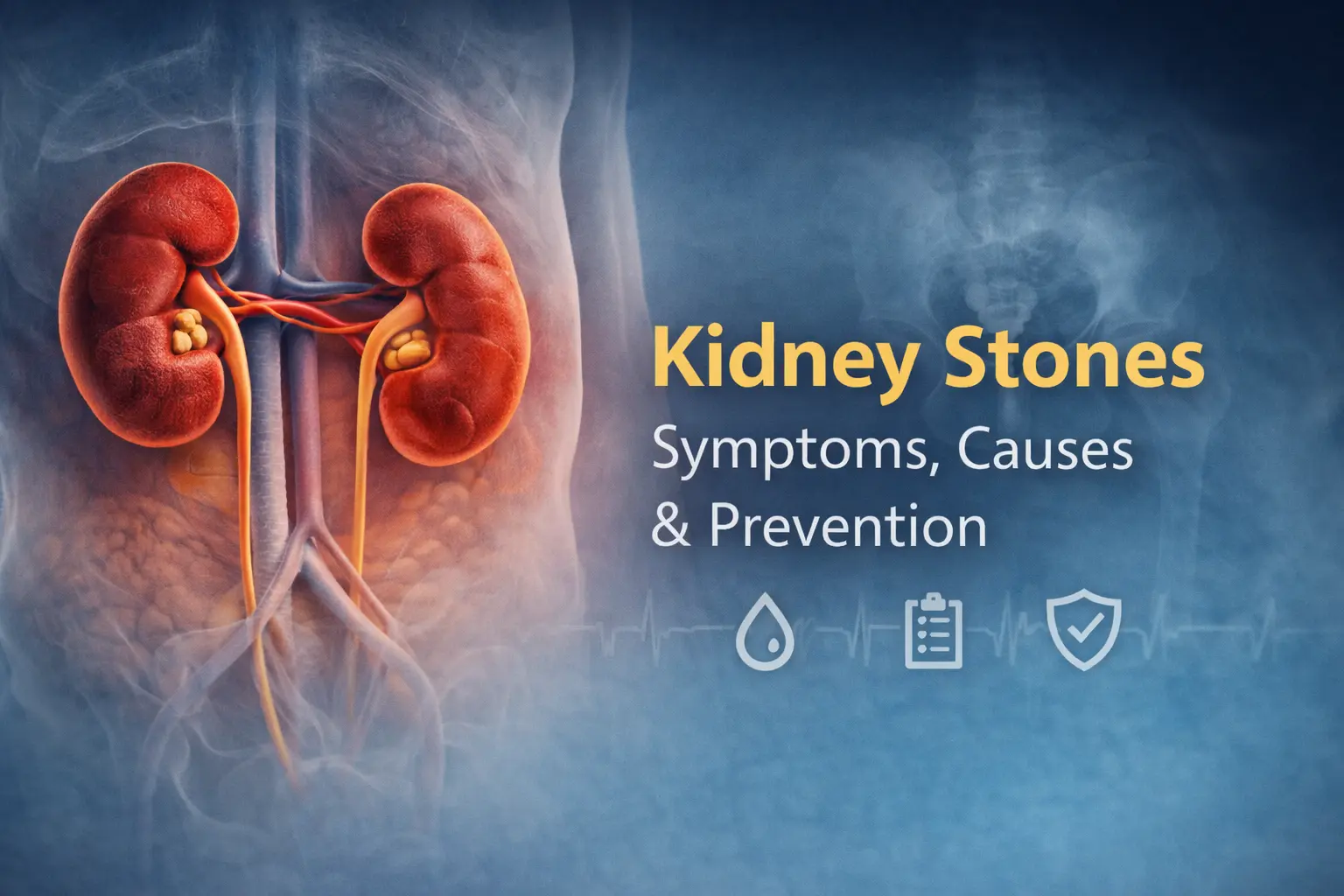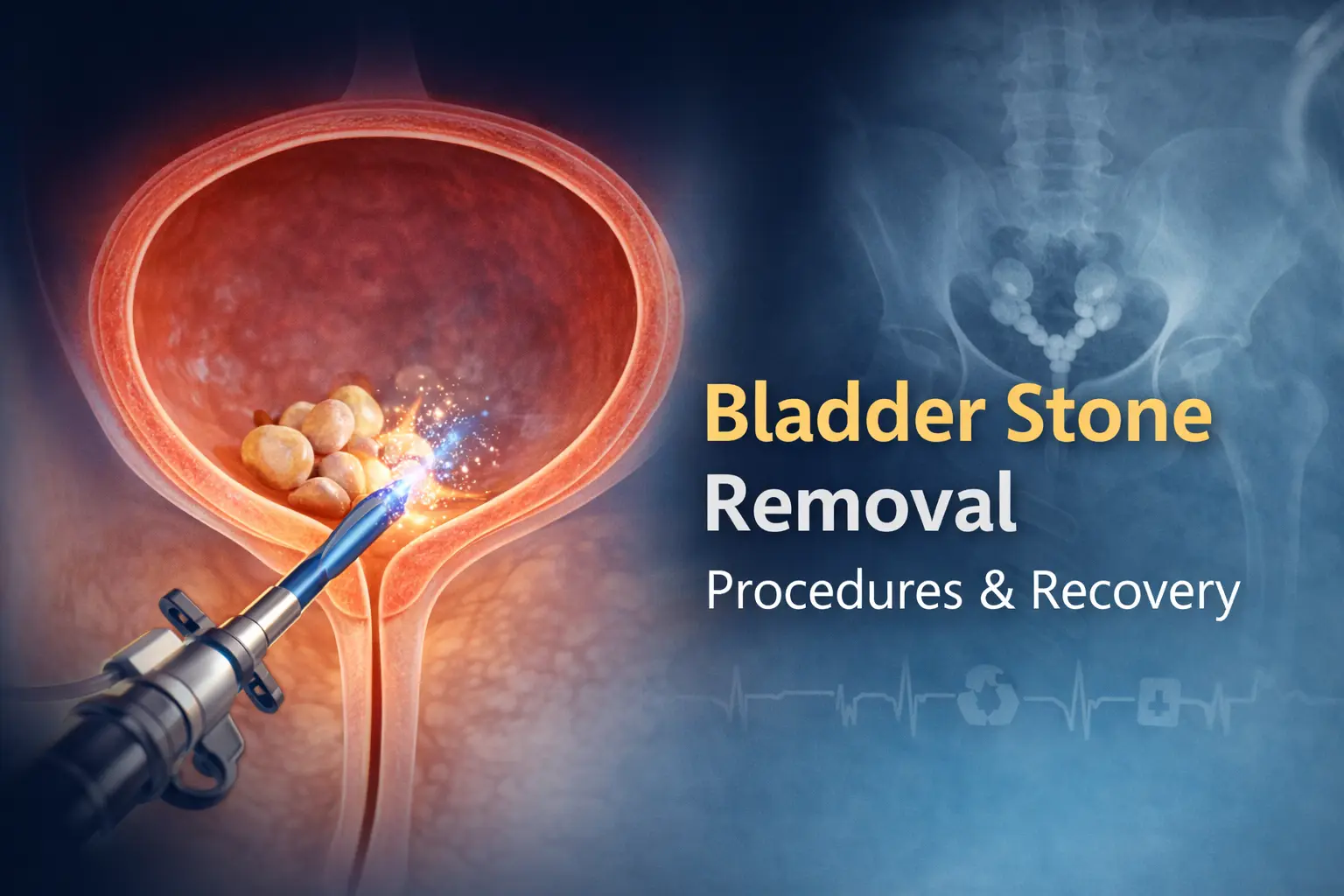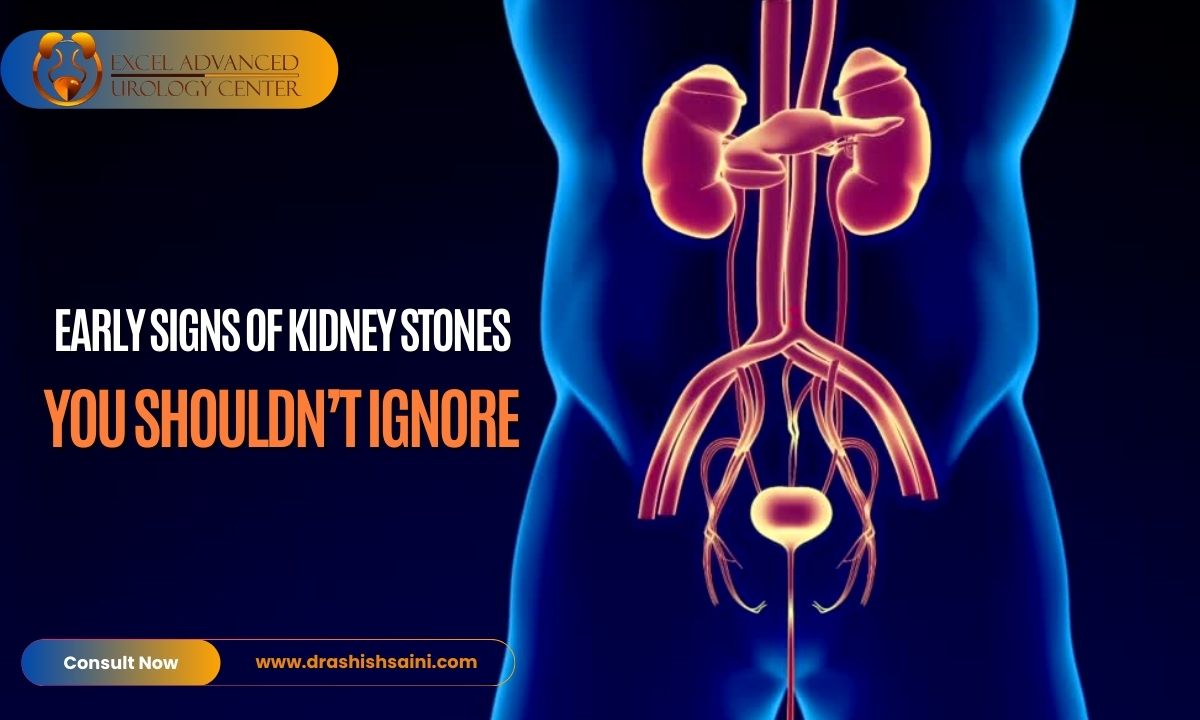

Kidney stones are one of the most common urinary problems people face, and yet, many ignore the early signs. Often, the first signs of kidney disease or kidney stones are mistaken for minor health issues like back pain, tiredness, or indigestion. But catching the early warning signs of kidney disease or kidney stones can help you avoid severe pain, complications, or even surgery later on.
In this article, we’ll walk you through the early signs of kidney stones, how to tell if it’s kidney trouble and not something else, and when it’s time to see a specialist.
Why Early Signs of Kidney Stones Detection Matters
The kidneys play a crucial role in keeping you healthy. They filter waste, regulate blood pressure, and balance minerals in your body. When they malfunction, symptoms may be subtle at first. Many patients don’t realize they are experiencing the signs of early-stage kidney disease until the problem becomes severe.
By recognizing the common signs of kidney disease or early signs of kidney stones, you can take action before it turns into a more serious condition like chronic kidney disease.
How Kidney Disease is Staged (CKD Staging)
Doctors classify kidney disease into stages based on eGFR (estimated glomerular filtration rate) and protein in urine (albuminuria):
Stage 1 (eGFR ≥90 + proteinuria) – Kidney damage with normal function
Stage 2 (eGFR 60–89) – Mild loss of kidney function
Stage 3 (eGFR 30–59) – Moderate kidney damage
Stage 4 (eGFR 15–29) – Severe damage
Stage 5 (eGFR <15) – Kidney failure (may require dialysis or transplant)
👉 Protein in urine (albuminuria) is often the first marker of kidney disease, even before eGFR drops.
Common Early Signs of Kidney Stones
Kidney stones don’t just appear overnight — your body often gives warning signals before the pain becomes unbearable. Recognizing these early signs of kidney disease and kidney stones can help you act quickly and avoid complications.
Let’s look at the most important early warning signs of kidney disease and kidney stones you should never ignore:
1. Pain in the Back or Side
One of the most classic signs of kidney trouble is sharp, cramping pain in your back, side, or lower abdomen. This pain, called renal colic, may:
- Come in sudden waves.
- Move towards the groin as the stone shifts.
- Be far more severe than muscle or joint pain.
👉 Pro Tip: If back pain doesn’t improve with rest or stretches, it could be an early sign of kidney disease rather than a spine issue.
2. Frequent Urination
Do you feel like you need to use the washroom more often, especially at night? This can be:
- A first sign of kidney disease where the kidneys lose efficiency.
- A symptom of kidney stones moving closer to the bladder.
Frequent urination is often confused with UTI or aging, but when combined with pain, it may point to early signs of chronic kidney disease or stones.
3. Burning Sensation While Urinating
A burning feeling or pain while passing urine can be due to:
- A stone moving in the urinary tract.
- Infection caused by blocked urine flow.
This is one of the warning signs of kidney disease symptoms that should never be ignored, especially if it occurs repeatedly.
4. Blood in Urine (Hematuria)
Seeing blood in your urine is always alarming — and rightly so. It is a clear sign of kidney malfunction.
- Your urine may appear pink, red, or dark brown.
- Sometimes blood is microscopic, detected only in lab tests.
Hematuria can be caused by stones, but it is also linked to the signs of early-stage kidney disease, infection, or even tumors.
5. Cloudy or Foul-Smelling Urine
Healthy urine is light yellow and clear. If it looks cloudy or smells bad, it could mean:
- An infection along with stones.
- Excess protein or pus in the urine.
This is one of the common signs of kidney disease that doctors use to decide if further testing is needed.
6. Nausea and Vomiting
Kidney stones can irritate nerves that connect to the digestive tract. This can lead to:
- Persistent nausea.
- Sudden vomiting without stomach-related illness.
If ignored, these can be early signs of chronic kidney disease, as your kidneys struggle to filter waste.
7. Swelling in Feet and Eyes
Swelling around your ankles or puffiness under your eyes in the morning may look harmless, but it is a strong early warning sign of kidney disease.
- It happens when kidneys leak protein into the urine.
- Your body retains salt and water, causing swelling.
This is often seen in signs of advanced kidney disease but can begin in the early stages too.
Quick Comparison Table Early Signs of Kidney Stones
Recent News & Facts on Kidney Stone
- Fact: According to the National Kidney Foundation (2024), 1 in 10 people will experience kidney stones in their lifetime.
- Fact: Kidney stones are 30% more common in summer months, especially in hot climates like India, due to dehydration.
- News (2025): The American Urological Association recently highlighted that smaller stones (<5 mm) often pass naturally, but ignoring symptoms increases the risk of chronic kidney damage.
What are the early signs of kidney stones?
The early signs of kidney disease and kidney stones include:
- Sharp back or side pain (renal colic).
- Frequent urination, especially at night.
- Burning sensation while passing urine.
- Blood in urine (pink, red, or brown).
- Cloudy or foul-smelling urine.
- Nausea or vomiting.
- Swelling around eyes, feet, or ankles.
👉 If you experience these warning signs of kidney disease symptoms, consult a urologist immediately to avoid complications.
Warning Signs That Need Urgent Care
Some symptoms shouldn’t be ignored at all. Seek medical attention if you have:
- Severe back or side pain that doesn’t go away.
- Fever or chills along with urinary problems.
- Inability to urinate despite discomfort.
- Large blood clots in urine.
These could be signs of advanced kidney disease or severe infection requiring immediate treatment.
Risk Factors That Increase Chances of Kidney Stones
You are more likely to develop stones if you have:
- A family history of kidney stones or kidney failure.
- Diabetes, high blood pressure, or obesity.
- A diet high in salt and animal protein.
- Dehydration, especially during hot summer months.
If you fall into these categories, watch for the early warning signs of kidney disease more carefully.
How Doctors Early Detect Kidney Disease
If you experience any of the signs of kidney disease symptoms, your urologist may suggest:
- Urine tests (to detect infection, blood, or crystals).
- Blood tests (to check kidney function).
- Ultrasound or CT scans (to confirm presence and size of stones).
- Repeat testing: CKD is diagnosed if abnormalities persist for ≥3 months
The good news is that with early diagnosis, stones can often be treated without major surgery.
Preventing Kidney Stones
Simple lifestyle changes can lower your risk of stones and other common signs of kidney disease:
- Drink 2–3 liters of water daily (unless medically restricted)
- Limit salt (≤5 g per day)
- Avoid excessive red meat and processed foods
- Manage blood pressure and blood sugar strictly
- Avoid unnecessary use of NSAIDs
- Quit smoking and stay active
These habits not only prevent stones but also keep your kidneys functioning well.
When to See a Urologist on Early Signs of Kidney Stones
Ignoring the first signs of kidney disease or kidney stones can lead to severe complications. If you notice persistent pain, changes in urine, swelling, or other signs of kidney trouble, it’s time to consult a specialist.
Dr. Ashish Saini – Best Urologist and Kidney stone Specialist in Delhi NCR
If you are searching for the best urologist in Delhi, South Delhi, or Greater Kailash, Dr. Ashish Saini is one of the most trusted names. Known as the best urologist and andrologist in Delhi NCR, he has years of experience in treating kidney stones, prostate problems, urinary issues, and male infertility.
Patients from across India consider him not only a skilled surgeon but also a compassionate doctor who listens and guides them through treatment. Conveniently located as a urologist in Greater Kailash, Dr. Saini makes advanced kidney care accessible for patients in Delhi and NCR.
Don’t wait for the signs of severe kidney disease to appear. If you notice any of the early signs of kidney disease, book a consultation with Dr. Ashish Saini, the leading urologist and andrologist in Delhi, and take control of your kidney health today.
👉 Your kidneys deserve expert care — don’t ignore the warning signs.
Conclusion
The early signs of kidney disease and kidney stones should never be ignored. From back pain to foamy urine, these are your body’s way of asking for attention. Early detection and timely treatment can save you from complications like advanced kidney disease or surgery.
If you are facing any signs of kidney disease symptoms, don’t wait. Book a consultation with Dr. Ashish Saini — the best urologist in Delhi, South Delhi, Greater Kailash, and NCR — and give your kidneys the expert care they deserve.
FAQ's on Early Signs of Kidney Disease
1. How to know if a kidney is healthy?
A healthy kidney efficiently filters waste, balances body fluids, and regulates blood pressure. Signs of good kidney health include:
Clear, light-yellow urine without blood or foam
No swelling in the feet, ankles, or around the eyes
Normal blood pressure and energy levels
Normal blood test results for creatinine and eGFR (>90 mL/min/1.73 m²)
No persistent pain in the back or sides
👉 Regular urine and blood tests are the best way to confirm kidney health, even if you feel fine.
2. What are the first warning signs of kidney disease?
The first signs of kidney disease may be subtle, such as:
Swelling in ankles, feet, or under the eyes (due to protein leakage)
Foamy or bubbly urine (early proteinuria)
Fatigue and reduced concentration
Frequent urination, especially at night
High blood pressure that is hard to control
Many patients don’t feel pain — which is why routine health checks are critical.
3. What does stage 1 kidney disease feel like?
Stage 1 CKD often has no obvious symptoms. Some people may notice:
Foamy urine (sign of protein leakage)
Mild swelling in hands, feet, or eyelids
Slight changes in blood pressure
Most patients discover stage 1 CKD during routine blood or urine tests, not because of how they feel.
4. What is the best indicator of early stage kidney disease?
The best indicator of early CKD is not a symptom but a test result:
eGFR ≥90 with protein in urine (albuminuria) confirms early damage
Albumin-to-creatinine ratio (ACR) is a sensitive test that detects tiny amounts of protein leakage before symptoms appear
👉 Protein in urine is often the earliest measurable sign of kidney disease.
5. What were your first signs of kidney disease?
Many patients report different early experiences. Common ones include:
Persistent fatigue and low energy
Swelling in ankles or puffy eyes
Foamy urine noticed in the morning
Frequent urination at night
High blood pressure discovered during a checkup
Each case is unique, but almost all patients realize in hindsight that they missed early, subtle changes.
6. What are the three early warning signs of a kidney?
The three most common early warning signs of kidney disease are:
Changes in urination – frequency, color, foamy/bloody urine
Swelling (edema) – ankles, feet, under eyes
Persistent fatigue or weakness – due to toxins and anemia
If these persist, it’s time for a kidney checkup.
7. What is the biggest indicator of kidney disease?
The biggest single indicator is protein in urine (albuminuria). It shows that the kidney’s filtering units (nephrons) are damaged. Other key indicators include:
Declining eGFR
High blood pressure linked to kidney dysfunction
Blood and urine tests remain more reliable than symptoms alone.
8. What foods should you avoid if you have kidney disease?
If diagnosed with CKD, dietary restrictions help protect kidney function:
Limit salt (sodium): processed foods, chips, pickles
Avoid excess protein: red meat, high-protein diets
Reduce potassium-rich foods (if levels are high): bananas, potatoes, oranges
Limit phosphorus: cola, processed cheese, packaged foods
Avoid long-term use of high-protein supplements and herbal remedies without medical advice
👉 A dietitian can personalize restrictions based on your lab results and CKD stage.
9. What are the signs of dying from kidney failure?
In end-stage kidney failure, when kidneys no longer work and dialysis/transplant is not used, signs may include:
Severe fatigue and confusion
Loss of appetite, nausea, vomiting
Fluid overload: difficulty breathing, swelling everywhere
Very little or no urine output
Seizures or unconsciousness in final stages
👉 These are signs of advanced failure and require urgent palliative or medical support.
10. Early signs of kidney disease in diabetes
Diabetes is the leading cause of CKD. Early diabetic kidney disease signs include:
Protein in urine (microalbuminuria)
Swelling in feet and ankles
Higher blood pressure despite medications
Increased urination at night
Fatigue and reduced energy levels
Routine urine albumin testing is recommended yearly for all diabetic patients.
11. Early signs of kidney disease in women
Women may experience kidney disease differently. Early signs can include:
Puffy eyes or swelling in ankles/feet
Foamy urine
Menstrual cycle irregularities due to hormonal imbalance from CKD
Recurrent urinary tract infections (UTIs) or pelvic discomfort
Fatigue and reduced appetite
👉 Women are sometimes misdiagnosed with UTIs when the underlying issue is kidney disease — making early screening important.


